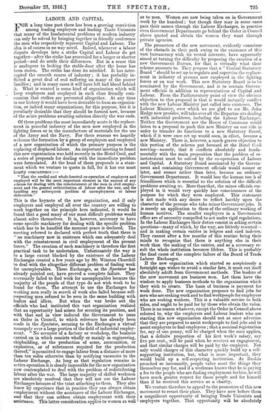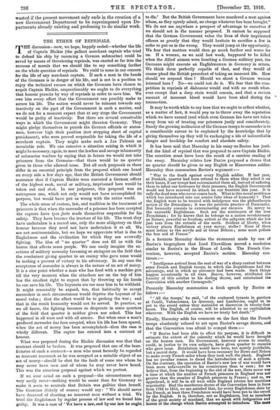LABOUR AND CAPITAL.
TOR a long time past there has been a growing conviction among leading employers and leading Trade Unionists that many of the fundamental problems of modern industry can only be solved by bringing toeether in friendly conference the men who respectively represent Capital and Labour. The idea is of course in no way novel. Indeed, whenever a labour dispute develops into a strike Capital and Labour do get together—after the strike has proceeded for a longer or shorter period—and do settle their differences. But in a sense this is analogous to locking the stable-door after the horse has been stolen. The strike has done its mischief. It has inter- rupted the smooth course of industry ; it has probably in- flicted a great deal of real suffering on many of the poorer families ; and in many cases it will have left bad blood behind it. What is wanted is some kind of organization which will keep employers and employed in such close friendly corn- raumon that strikes are prevented altogether. At any time in our history it would have been desirable to form an organiza- tion, or indeed many organizations, for this purpose, but it is peculiarly desirable that they should be formed now, because of the acute problems awaiting solution directly the war ends.
Of these problems the most immediately acute is the replace- ment in peaceful industry of the men now employed in the fighting forces or in the manufacture of materials for the use of the Army and the Navy. For these reasons we heartily welcome the formation by a-group of employers and employed of a new organization of which the primary purpose is the replacing of displaced labour. An importantmeeting to found this new organization was held recently in the Hotel Cecil, and a series of proposals for dealing with the immediate problem were formulated. At the head of these proposals is a state- ment which we venture to quote in full, for it has our most hearty concurrence :— " That the cordial and whole-hearted co-operation of employers and employed will be the most important element in the success of any scheme for dealing with the reinstatement of the men in civil employ.
• ment and the general redistribution of labour after the war, and for handling any subsequent problem of unemployment or labour dislocation."
This is the 'keynote of the new organization, and if only employers and employed all over the country are willing to work together on the principle here indicated, it would be found that a good many of our most difficult problems would almost solve themselves. It is, however, necessary to have some specific machinery for dealing with the specific problem which bas to be handled the moment peace is declared. The meeting referred to declared with perfect truth that there is " no machinery now in existence which can adequately deal with the . reinstatement in civil employment of the present forces." The creation of such machinery is therefore the first practical task to. be undertaken. Unfortunately the way is to a large extent blocked by the existence of the Labour Exchanges created a few years ago by Mr. Winston Churchill to deal with the altogether different problem of finding work for unemployables. These Exchanges, as the Spectator has already pointed out, have proved a complete failure. They necessarily failed to find work for unemployables because the majority of the people of that type do not wish work to be found for 'them. The attempt to use the Exchanges for working men really in search of work also failed because self- respecting -men .refused to 'be seen in the same building with, loafers and idlers. But when the war broke out the officials who had instituted this vast organization realized that an opportunity had arisen for securing its position, and with that end in view induced the Government to issue an Order in Council, to which reference has already been made in the Spectator, securing to the Exchanges a virtual'. monopoly over a large portion of the field of industrial employ- ment. No occupier of a factory or workshop, the business carried on in which consists wholly or mainly in engineering, shipbuilding, or the production of arms, ammunition, or explosives, or of substances required for the production thereof," is permitted to engage labour from a distance of more than ten miles otherwise than by notifying vacancies to the Labour Exchange. As long as that regulation remains in active operation it is dearly impossible for the new organization now contemplated to deal with the problem of redistributing labour after the war. The large majority of skilled workmen are :absolutely resolved that they will not use the Labour Exchanges because of the taint attaching to them. They also know by experience that in practice they can always obtain employment without the assistance of the Labour Exchanges, and that they can seldom obtain employment with their assistance. This latter consideration applies'to women as well as to men. Women are now being taken on in Government work by the hundred ; but though they may in some cases pass their names through the Labour Exchanges, in practice even Government Departments go behind the Order in Council above quoted and obtain the women they want through private agencies.
The promoters of the new movement, evidently conscious of the obstacle in their path owing to the existence of this vast bureaucracy with its vested interests, have apparently aimed at turning the difficulty by proposing the creation of a new Government Bureau, for that is virtually what their scheme amounts to. They propose that a " Central Statutory Board " should be set up to regulate and supervise the replace- ment in industry of persons now employed in the fighting forces or on war work. This new Statutory Board is to Le nominated by the Government, and is to contain Govern- ment officials in addition to representatives of Capital .and Labour. From the Parliamentary point of view the obvious objection to this proposal is that it would instantly . conflict with the new Labour Ministry just called into existence. The Labour Ministry, over which we are glad to see Mr. John Hodge now presides, will take over all the Departmf nts dealing with industrial problems, including the Labour &changes. Neither 'the Government nor the House of Commons would listen to a proposal to push this new Ministry on one side in order to transfer its functions to a new Statutory Board, which if it were once set up would soon, in effect, become a new Ministry. There is, however, a much graver objection to this portion of the scheme put forward at the Hotel Cecil meeting—namely, that it conflicts absolutely and funda- mentally with the main proposition that the problem of re- instatement must be solved by the co-operation of Labour and Capital. A Statutory Board nominated by the Govern- ment and containing Government officials would sooner or later, and sooner rather than later, become an ordinary Government Department. It would lose the human tou:h of friendliness which is essential to the solution of the difficult problems awaiting us. More than that, the minor officials em- ployed in it would very quickly lose consciousness of the purpose for which they were employed. This statement is not made with any desire to reflect harshly upon the character of the persons who take minor Government jobs. It is merely an application to them of the ordinary working of human motives. The smaller employees in a Government office are of necessity compelled to act under rigid regulations. In the Labour Exchanges their duties consist in asking certain questions—many of which, by the way, are bitterly resented— and in making certain entries in ledgers and card indexes. They cannot after a few months of this routine bring their minds to recognize that there is anything else in their work than the making-of the entries, and as a necessary re- sult the whole institution becomes lifeless. This is -probably the final cause of the complete failure of the Board of Trade Labour Exchanges.
If the new organization which started so auspiciously a fortnight ago wishes to avoid a similar fate, it must cut itself absolutely adrift from Government methods. The leaders Of the new movement are business men. Let them have the wisdom to apply business methods to the organization which they wish to create. The basis of business is payment for work done. The new organization proposes to find jobs for men who are seeking work and to find workpeople for employers who are seeking workers. This is a valuable service to both sides, and ought to be paid for by those who obtain the value. There is no reason whatever, except the Order in Council above referred to, why the employers and. Labour leaders who am starting this new organization should not at once advertise that they are prepared to assist workpeople to find jobs and to assist employers to find employees ; that a nominal registration fee, say of one penny, will be charged when the man applies, that a definite proportion of his first week's salary, say five per cent., will be paid when he receives an engagement, and that similar charges will be paid by the employer. Not only would charges of this character quickly build up a self- supporting institution, but, what is more important, they would build up a self-respecting institution. As Ruskin preached so incessantly, people value most the things they themselves pay for, and if a workman knows that he is paying a fee to the people who are finding employment for him, he will have much greater respect for those people and for himself than if he received this service as a charity.
We venture.therefore to appeal to the promoters of this new movement to recast their plans. They have now before them a magnificent opportunity of bringing Trade Unionists and employers together. That opportunity will be absolutely wasted if the present movement only ends in the creation of a new Government Department to be superimposed upon De- partments already existing and professing to do similar work.



































 Previous page
Previous page